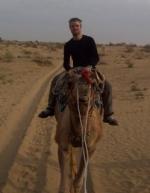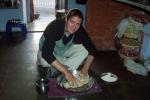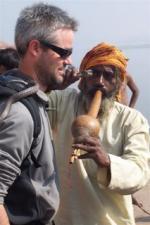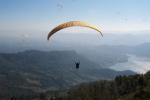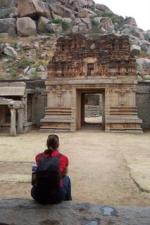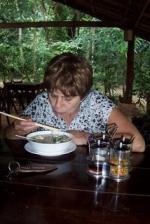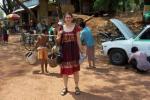|
Comparing the two neighbours today, and it is hard to fathom what happened. Thailand's new capital at Bangkok is a booming hive of modernity sprouting towering skyscrapers and high-tech Starbucks-studded mega-malls. Meanwhile, Myanmar's aged ex-capital at Yangon is a dusty grid of crumbling British colonial buildings struggling to maintain their dignity in slow decay. Somehow, in the last century, something went wrong in Myanmar.
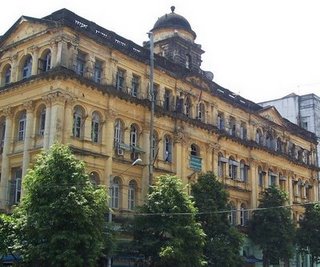
Yangon's crumbling city hall.
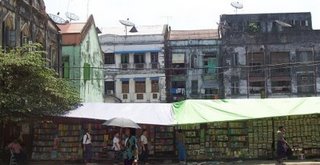
A woman walks past an outdoor Burmese book market shielding herself from the relentless Myanmar sun.
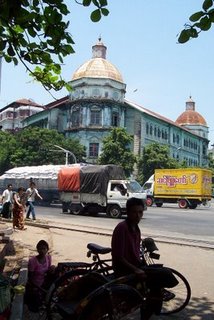
Sadly uncared for and somehow anachronistic in downtown Yangon, the bright greens, yellows, and turquoise of Britain's influence still radiate a melancholy beauty.
Fortunately for us, it is much easier for a tourist to enter Myanmar than an aid worker. Within days of applying for permission to visit Myanmar, we found a hotel taxi waiting for us at Yangon airport to take us to "The Motherland 2" hotel. We were soon stumbling apprehensively through Yangon's dark and potholed checkerboard of Technicolor colonial buildings- vestiges of British rule when Burma was considered part of its Indian colony. Yangon's rooftops became a jungle of antennas after the military junta recently allowed BBC and National Geographic to reach households. Long isolated from the rest of the world, Yangon's skyline is a powerful testament to a beleaguered colonized people grasping for knowledge and a sense of inclusion into the outside world. There was something of South East Asia in the smiling faces around us. Something of India in the crowded concrete holes in the wall full of tea-drinking beetle-nut spewing coolies. But then there are regional touches all its own: green cheroot cigars hanging from wizened grandmothers, yellow thanakha drying on a baby's face, green uniforms and metal helmets worn by the government's ubiquitous police.
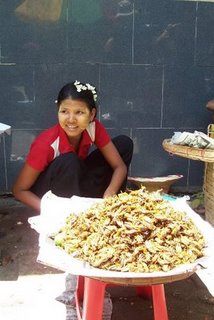
Burmese women are among the world's most beautiful- shown here selling roasted crickets with characteristic smile. The next time Myanmar shows up on the news, watch for the pale yellow paint on the faces of nearly all Burmese women and children. It is a paste derived from tree bark, called thanakha, and is a form of sunscreen. As far as I know, the Burmese are the only people in the region to wear sun block.
Myanmar never really made it on the tourist radar map- odd considering it has vast stretches of white-sand beaches that rival Thailand's, a temple complex more vast and exotic than Angkor Wat, and huge tracks of unspoiled nature which are among the least-visited places on the planet. Nevertheless, these obvious draws are probably not why a small cadre of crusty backpackers visit Myanmar each year- indeed, they probably never even knew about it since traveling to this land is discouraged by self-respecting foreign travel agents. Rather, they come because they shouldn't be here. And this is how visitors feel their first night in Yangon: the exhilaration of witnessing the forbidden as pairs of warm and curious eyes follow them with mixed feelings from the bustling sidewalk market places.
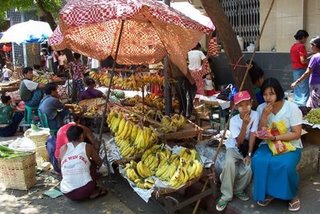
Sidewalk banana store.
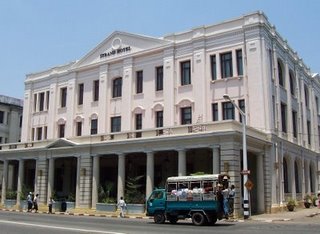
What passes for public transportation in Yangon (an old pickup crammed so full of people they are forced to hang out the back) drives past the colonial-era Strand Hotel. This gorgeous hotel was perhaps the most luxurious in the British Empire, catering exclusively to white clientele.
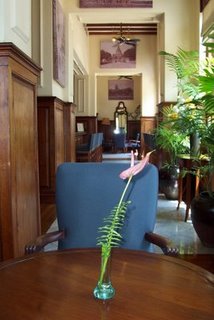
Burmese people weren't allowed inside the Strand Hotel until its independence in 1948. Myanmar has always had an abundance of natural resources, and this wealth can be found in some parts of Yangon and other major cities. The problem is that throughout its recent history, the money has been horded by those in power and never made its way to the general populace.
The people of Myanmar are among the world's most friendly and hospitable, but somehow their government is among the world's most ruthless and oppressive. Britain's rapid withdrawal from its former colonies resulted in many tumultous years in Burma, until a military strong man by the name of General Ne Win seized control in 1962. Since then, he and his military junta have accumulated a long list of human rights abuses and a history of tragic mis-management along their bizarre march towards a Burmese Socialist Utopia.
Just how crazy is General Win ?
He believes that the number "9" is an auspicious figure with magical properties. As his incompetent rule continued to erode the country's former wealth until Burma became one of the ten poorest countries on earth, he devised the following economic policy:
On September 9th (the 9th day of the 9th month), he invalidated all 50 and 100 Kyat notes, replacing them with 90 and 45 kyat notes (9 + 0 = 9, 4 + 5 = 9, and like all numbers with this property, evenly divisible by 9) . It is tempting to attribute this decision to a naive, though well-intentioned, autocratic nut-head infatuated with numerology. However, this interpretation is far too generous. It was later revealed that he changed the currency to add up to 9 only because his astrologer told him he would live to be 90 (there's that number 9 again !) if he did this. Regardless, many people lost their fortunes overnight.
Understandably upset, students all over the country protested on August 8, 1988. This event is called "8-8-88" or "four eights uprising" by the people of Myanmar referring to its date. Ever superstitious, many people in Myanmar believe the number "8" is also thought to have magical powers. The regime reacted with a spree of killings and arrests so terrifying that there wouldn't be another large scale protest for nearly twenty years. In a seemingly miraculous change of face, the junta agreed to open elections in 1992. Not surprisingly, their rival party, the National League for Democracy (NLD), won eighty percent of the parliamentary seats. Having exposed themselves, these representatives were promptly arrested and their supporters harassed. The spiritual and political leader of the NLD, Aung San Suu Kyi, remains under house arrest to this day.
The beautiful and eloquent Aung San Suu Kyi has won both the Nobel Peace prize and the hearts of her people. She is one of the most prolific and well-respected modern writers on democracy and human rights. Aung San Suu Kyi doesn't want us to visit her country.
"The Lady", as Aung San Suu Kyi is referred to in Myanmar, believes tourism brings both respectability and economic aid to a nefarious regime. She thinks tourists are shuttled in air-conditioned tour buses between the government-approved attraction, don't have an opportunity to interact with local people, and will therefore bring home a distorted and incomplete view of the country. She has also suggested irresponsible mass-tourism will devalue and comodify Myanmar's traditions. In her own words, "to suggest that there's anything new that tourists can teach the people of Burma about their situation is not simply patronising - it's also racist."
Ironically, it is the reclusive military junta that wants us to visit. In their words, "tourism will replace criticism from abroad".
Others argue they are both wrong: tourism will heighten public awareness abroad, bring much-needed money to the people, and provide a meaningful cultural and language exchange.
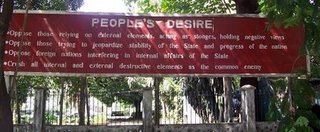
The People's Desire, as dictated by the military junta, is posted in all of Myanmar's public parks and published daily in the country's propaganda-ridden newspapers.
General Ne Win's military junta remains in power today. His legacy is a country who's formidable wealth of natural resources benefits only a small number of government officials and their Chinese patrons, while much of the rest of the population lives in poverty. Of course, Myanmar's political situation is more complicated than one man and nobody really knows the ultimate reason for the divergent fates of Thailand and Myanmar. Nevertheless, the Burmese people offer their own theory: ever superstitious and mystical, they believe Ne Win was the reincarnation of a Thai prince defeated and executed by the Burmese who swore an oath of vengeance and put a curse on the Burmese nation. General Ne Win died six years ago, having lived to see his 90th birthday.
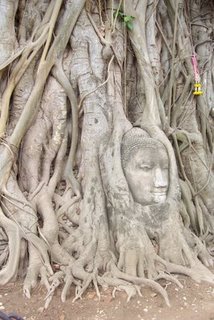
Ayathuya is home to one of Thailand's most famous images: the head of Buddha wrapped in the roots of a Bodhi tree. The combination of Buddhist imagery and nature is considered particularly auspicious.
|




